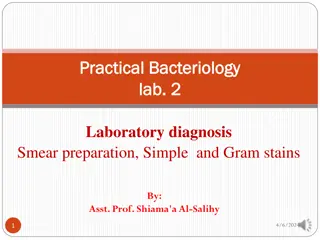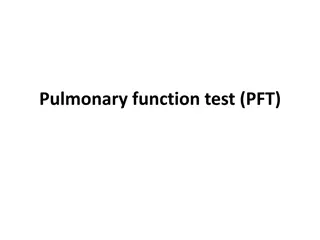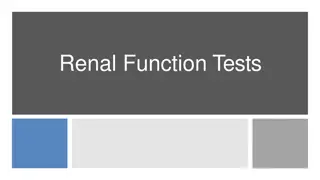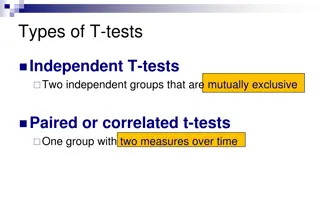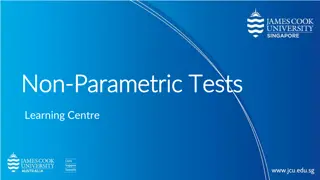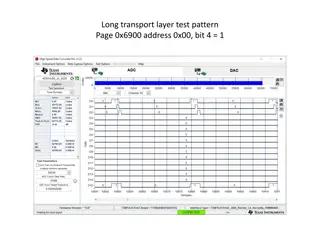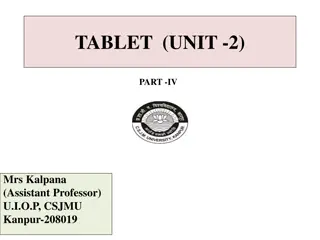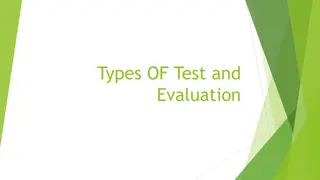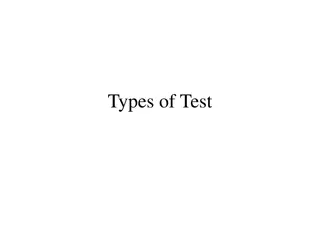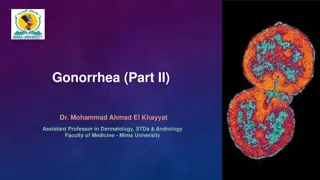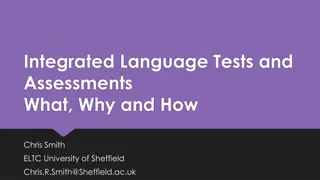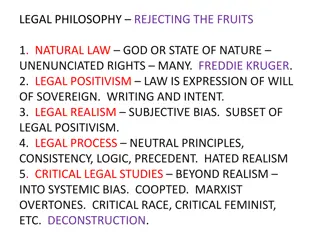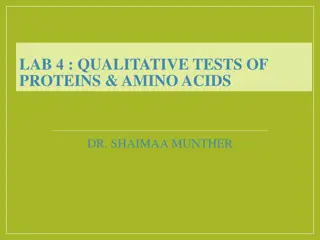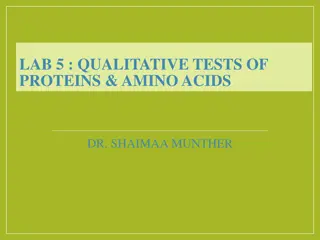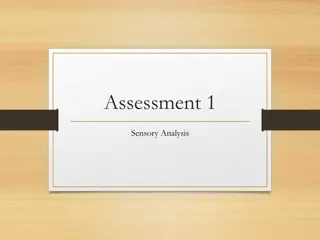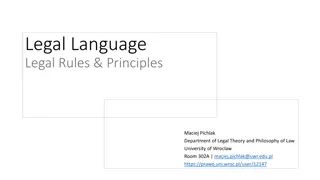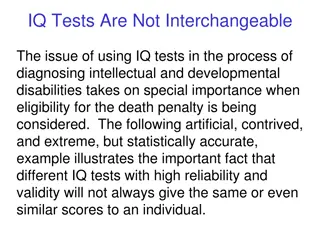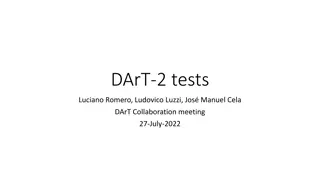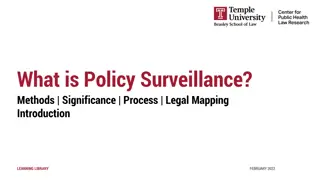Construction of an Achievement Test
Learn about achievement tests, standardized tests, oral tests, essay tests, and more for student evaluation. This guide discusses various types of tests and their purposes in assessing student learning. Enhance your understanding of educational assessment methods with this comprehensive resource
0 views • 29 slides
Practical Bacteriology Laboratory Diagnosis and Sample Collection
This practical guide focuses on laboratory diagnosis steps in bacteriology, covering specimen collection, microscopic examination, culture tests, biochemical tests, serological tests, and molecular tests. Learn about various sample collection methods for urine, stool, swabs, sputum, pus, CSF, and mo
3 views • 23 slides
Understanding Bial's & Seliwanoff's Tests in Clinical Chemistry
Bial's and Seliwanoff's tests are chemical tests used to detect the presence of pentoses in a sample, distinguishing them from hexoses. These tests involve specific reactions with reagents to produce distinct color changes based on the type of sugar present. The Bial's test, particularly sensitive t
0 views • 17 slides
M O N I T O R T R A I N I N G F L O R I D A S TAT E W I D E A S S E S S M E N T S
Monitoring and Assessment Overview for Florida's Statewide Assessments (ARDA) in Spring 2023 encompass a range of standardized tests administered across districts to ensure test integrity and validity. Tests include FSA, FAST, NGSSS, and B.E.S.T., covering ELA, Math, and Science for various grade le
0 views • 30 slides
Understanding the Difference Between Legal Information and Legal Advice
Legal information provides facts about the law and legal processes, while legal advice offers guidance on courses of action to further interests. Legal information is like the rules of a game, explaining basics, while legal advice is akin to the strategies for winning. This article explores the dist
0 views • 12 slides
Understanding SOLs: Information for Parents at Lees Corner - Spring 2022
SOLs, or Standards of Learning tests, are standardized assessments in Virginia to measure student mastery of grade-level content. These tests are essential for graduation requirements, school effectiveness evaluation, and meeting both federal and state testing mandates. Students are tested on variou
1 views • 12 slides
Comprehensive Overview of Pulmonary Function Tests (PFTs)
Pulmonary Function Tests (PFTs) are vital for assessing pulmonary gas exchange through ventilation, diffusion, and lung perfusion. These tests include measurements of lung volume, airway patency, gas exchange efficacy, and pulmonary blood flow. PFTs offer benefits in diagnosing dyspnea, monitoring d
0 views • 14 slides
Understanding Verbal and Non-Verbal Tests
Verbal and non-verbal tests serve different purposes in assessing intelligence and skills. Non-verbal tests utilize images and diagrams to measure reasoning abilities without requiring reading or writing. Verbal tests, on the other hand, assess language-based skills through reading, writing, or oral
0 views • 14 slides
Understanding Renal Function Tests and Kidney Health
Renal function tests are essential for diagnosing and monitoring kidney health. These tests assess functions like glomerular filtration, tubular reabsorption, and endocrine functions of the kidneys. Common indicators include serum urea, creatinine levels, and more. It's crucial to evaluate renal fun
0 views • 34 slides
Understanding Different Types of T-Tests in Psychological Research
This article provides an overview of different types of t-tests used in psychological research, including independent t-tests for comparing two groups, paired or correlated t-tests for within-group comparisons, and the assumptions behind conducting these tests. It also includes examples of when to u
1 views • 7 slides
Understanding Non-Parametric Tests and Their Applications
Non-parametric tests serve as valuable alternatives to parametric tests when data do not meet specific criteria. This article explores the concept of non-parametric tests, types of non-parametric tests, and provides insights on conducting the Mann-Whitney U Test using SPSS for practical research app
4 views • 32 slides
Long Transport Layer Test Patterns for Data Evaluation
Explore various test patterns for data evaluation purposes including long transport layer tests, ADC data reverse order tests, 12-0ctet RPAT tests, and D21.5 tests. These patterns involve specific addresses and data configurations that need to be established before usage with TSW14J57EVM. Each patte
0 views • 4 slides
Quality Control Tests for Tablet Production
Quality control tests play a crucial role in ensuring the safety and efficacy of tablet products. This article discusses various parameters like general appearance, size, shape, unique identification markings, organoleptic properties, hardness, friability, weight variation, and content uniformity th
1 views • 11 slides
Understanding Types of Test and Evaluation in Education
Explore the various types of tests used in education, including pre-tests, mastery tests, and diagnostic tests. Learn about different mediums for testing, such as oral, written, and performance tests. Discover the role of examinees in essay-type and objective-type tests. Lastly, delve into different
1 views • 13 slides
Understanding Achievement and Aptitude Tests in Education
Explore the differences between achievement and aptitude tests, such as how they measure abilities and knowledge. Learn about teacher-made tests, standardized tests, low-stake, and high-stake tests. Discover the importance of achievement tests in evaluating present proficiency and aptitude tests in
1 views • 16 slides
Gonorrhea Diagnostic Methods and Tests Overview
Dr. Mohammad Ahmad El Khayyat, an Assistant Professor in Dermatology, STDs, and Andrology, details the diagnostic methods and tests for gonorrhea. Various tests including Gram stain, culture, antigen detection tests, and nucleic acid amplification tests are discussed, highlighting sensitivity and sp
1 views • 30 slides
Understanding Achievement Tests in Education
Achievement tests play a crucial role in assessing student progress in schools, aiding curriculum planning, and evaluating teaching programs. These tests measure individual accomplishments after a period of learning, helping to determine the effectiveness of instruction. Characteristics such as reli
2 views • 30 slides
Integrated Language Tests and Assessments Overview
This content delves into integrated language tests and assessments, exploring the differences between separate skills tests and integrated tests. It covers the rationale behind integrating language skills, examples of integrated skills tests, as well as shortcomings to avoid in test design. Key aspe
2 views • 35 slides
Quality Control Tests for Pharmaceutical Packaging Materials
This article discusses quality control tests for pharmaceutical packaging materials focusing on glass containers. The tests include chemical resistant tests such as powdered glass test and water attack test, as well as hydrolytic resistance tests. Detailed procedures for each test are outlined along
3 views • 18 slides
Role and Responsibility of Legal Aid Panel Lawyers Presentation
The presentation by Rajasthan State Legal Services Authority discusses the vital role of legal aid panel lawyers in providing legal services to the marginalized and weaker sections of society. It emphasizes the responsibilities of panel lawyers in offering competent legal assistance, spreading legal
0 views • 22 slides
Enhancing Quality Standards of Legal Clinical Education in Ukraine
The Association of Legal Clinics of Ukraine (ALCU) is dedicated to promoting high-quality legal clinical education in the country. They have established standards and assessment tools to ensure the effectiveness of legal clinics, with a focus on providing free legal aid and raising legal awareness.
1 views • 10 slides
Access to Justice Through Public Legal Education in Alberta
The Centre for Public Legal Education Alberta (CPLEA) is a not-for-profit organization offering plain language legal education and information to empower individuals in understanding their rights and responsibilities. Public Legal Education (PLE) helps people address legal issues independently by pr
0 views • 20 slides
Understanding Legal Philosophy: Rejection of Traditional Frameworks
Explore various schools of legal philosophy such as natural law, legal positivism, legal realism, legal process, and critical legal studies. Discover the evolution of civil rights through key amendments and landmark cases shaping modern legal interpretations.
0 views • 194 slides
Understanding Legal Aid and Access to Justice
Legal aid is a state-funded support system aimed at providing legal assistance to individuals who cannot afford legal help. However, the availability of legal aid has been significantly impacted over the years by various acts and changes in the legal system. The unmet need for legal services arises
0 views • 22 slides
Legal Aid Provision and Access: Challenges and Solutions
Rebecca Rayment, a former Legal Aid lawyer and current Chief Executive of Manuel Bravo Project, addresses the complexities of accessing legal assistance, specifically focusing on Legal Aid for vulnerable asylum seekers and migrants. The presentation delves into the current legal advice provision, ch
0 views • 15 slides
Qualitative Tests of Proteins & Amino Acids: Overview and Analysis
In this lab, you will delve into the qualitative tests for proteins and amino acids, understanding their structures, classifications, and importance in food and human nutrition. The tests include solubility tests and identification tests for both amino acids and proteins, revealing their presence an
0 views • 13 slides
Understanding Legal Reasoning: A Comprehensive Insight
Legal reasoning involves navigating through gaps, inconsistencies, and ambiguities in the law to interpret and apply legal norms effectively. This process of validation, interpretation, and application helps legal practitioners optimize the legal system and adapt it to real-life cases. The presentat
0 views • 21 slides
Qualitative Tests of Proteins & Amino Acids - Lab Analysis Overview
This lab analysis covers qualitative tests for proteins and amino acids, including solubility tests and identification tests for amino acids and proteins. Specific tests like Ninhydrin test for -L amino acids, Xanthoproteic test for aromatic amino acids, and lead sulfite test for sulfhydryl group de
0 views • 13 slides
Iowa Legal Aid: Free Legal Assistance for Low-Income Iowans
Iowa Legal Aid offers free legal assistance to low-income Iowans, covering a range of civil legal issues such as family law, housing, consumer rights, and more. Services are provided through regional offices across Iowa, with easy application processes and multilingual support available. Learn how t
1 views • 26 slides
Understanding the Finnish Legal Profession of Attorneys-at-law
Attorneys-at-law in Finland are highly trained legal professionals who play a crucial role in upholding the rule of law. Only members of the Bar Association can hold this title, ensuring quality legal services for clients. The profession includes different roles such as licensed legal counsel, publi
0 views • 16 slides
Evolution of Legal Aid: From Inception to Present Challenges
The evolution of legal aid from its establishment in 1949 to the current challenges faced post the Legal Aid, Sentencing and Punishment of Offenders Act 2012 has been marked by changes in funding, administration, and accessibility. Despite initial state-funded schemes and subsequent reforms, recent
0 views • 24 slides
Sensory Analysis Tests in Food Evaluation
Explore different sensory analysis tests used in food evaluation, including paired comparison tests for sweetness, quantitative descriptive analysis for taste attributes, and affective tests like hedonic tests. Understand the purpose and methodology of each test to enhance product development and qu
0 views • 12 slides
Legal Language, Rules, and Principles: Understanding Norm Structures and Legal Personhood
Explore the structure of legal norms, including their components - hypothesis and disposition. Learn about the addressee of norms, legal personhood, and legal capacity. Discover how in New Zealand, land and rivers have been granted personhood, akin to corporations, in legal terms. Dive into a case s
0 views • 20 slides
Legal Aid Board and Abhaile: Providing Legal Assistance to Those in Need
Legal Aid Board offers civil legal aid and advice to individuals with insufficient means, following the Civil Legal Aid Regulations. Abhaile provides financial and legal guidance to insolvent individuals at risk of losing their homes. The solicitors panel, established by the Board, ensures legal ser
0 views • 27 slides
Understanding IQ Tests in Legal Context: Importance of Different Measures
The use of IQ tests in legal settings, such as determining eligibility for the death penalty, requires careful consideration due to the unique characteristics of different tests. This scenario involving Sam Adkins highlights how varying cognitive measures can lead to disparate results, emphasizing t
0 views • 15 slides
DArT-2 Tests and Experiments Overview
The DArT-2 tests involve twin experiments - DArT-2 and DArT-Test, focusing on ensuring the performance of DArT-2 in studying underground argon. Various tests like electronic tests of the PDM and vacuum tests are conducted to guarantee proper operation. Challenges with vacuum sealing and solutions li
0 views • 8 slides
Overview of Legal Philosophy and Civil Rights Amendments
Understanding various legal philosophies such as natural law, legal positivism, legal realism, legal process, and critical legal studies, this content delves into the historical context of civil rights amendments, including the 13th, 14th, and 15th Amendments. It discusses significant cases and prov
0 views • 194 slides
Understanding the Differences Between Objective and Projective Tests
Objective tests aim to maximize objectivity by providing structured response options, while projective tests delve into hidden emotions and conflicts through ambiguous stimuli. Pros of objective tests include standardization and reliability, but projective tests offer unique insights based on indivi
0 views • 10 slides
Understanding Policy Surveillance and Legal Mapping in Public Health Law Practice
Policy surveillance involves the systematic tracking of public health laws and policies over time and across jurisdictions using a rigorous scientific approach to generate data for evaluation and research. This process helps create legal data, build workforce legal capacity, support innovation diffu
0 views • 10 slides
Understanding Unit Testing in Software Engineering
Concept Software is a discipline comprising various code pieces. Testing these codes together is complex but vital in Software Engineering. The process includes early testing like unit tests, pairwise/multiple component testing, module testing, integration testing, user tests, alpha tests, beta test
1 views • 6 slides

